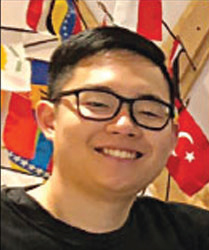
Daniel Jin Rutherford HS Rutherford, NJ 12th Grade
Never did I think a person would judge my mother’s Kimchi Jjigae, but the fateful day arrived when I was in the third grade. The little third grader in me was excited about lunch. My mother packed a traditional Korean dosirak. Was it bulgogi? Fried rice? My heart was beating with excitement. I opened the lid, and there it was: my mother’s Kimchi Jjigae. My classmates yelled, “Ew! What’s that smell? Get your Chinese food away from me!” The response was overwhelming, and the eight-year-old inside of me burned with confusion and shame. I ran to the nearest trash and tossed away my mother’s homemade lunch.
As an eight-year boy would, I cried and ran home into my mother’s arms. I tried to translate my traumatic experience from English to Korean, but it was difficult for my mother to understand my clumsy message. Since then, I tried to separate myself from my Korean identity - the food, language, and culture. All of them served as reminders that I was “different” in an undesirable way. For the next seven years of my life, I attempted to shun the Korean half of my identity as much as I could. At the age of fifteen, I realized that I was hurting the relationship I had with my mother. It was the ultimate disrespect; I couldn’t communicate with my mother in her native tongue for no reason other than my refusal to learn the language. For many years, my mother would teach me Korean in hopes that I would understand the language. Everything from sending me to Korean school to considering the option of sending me to live in Korea did not work. But the desperation to fit in with my peers had a powerful grip on me and blinded me to her efforts. After seven years I felt as though I had let both my mother and my Korean half down.
I looked myself in the mirror one day and said to myself, “I am who I am, and I am both Korean and American. I am not one or the other.” With that, I began this transformation to become the true Korean-American that I am meant to be. My whole life I thought that I had to be either fully “Korean” or fully “American” - I didn’t understand that a balanced was needed or even possible. However, small moments (like when I caught myself watching Korean programs while eating a Whopper helped me realize I was already both. Non-Koreans, due to their lack of understanding and care, cause them to judge and make careless statements about us - thus, the backlash that my mother’s Kimchi Jjigae got back in the third grade.
I have realized that to dismantle social ignorance towards Korean Americans like myself, young Korean Americans must be comfortable with themselves first. I feel that Korean-Americans must make peace with themselves and to share their pride with other fellow Korean Americans. I know there are so many Korean Americans out there who are currently going through discriminating experiences like the ones I have gone through. I consider myself lucky to have passed that stage of mine. I know plenty of people who are stuck in that stage of loneliness and confusion about being Korean American, and I know plenty who have abandoned it completely. Thus, I feel it is my responsibility to bring some change to make those people in the bubble comfortable and proud to be Korean American. Although I may not be of such influence on an international scale, I firmly believe in the saying that the small changes will make big differences.
As I go off to college this fall, I will join Korean American Student Associations to bring positive change to my campus regarding the views of Korean Americans in society. Through organizing events about Korean culture, I hope to accomplish two things. One, to shed light upon the non-Korean American community on campus that Koreans are not all that they have been portrayed as through the media, and, second, I will show that we are more than just some stereotypes. KASA’s would allow for the non-Korean American community to fully appreciate and understand who we are as a community and our place in American society. Also, it would allow for a group of fellow Korean Americans to share a special bond that is unlike any other club or friend group. Having families, or “gajoks,” would allow for those who do not know who they are, to connect with those like myself who have broken out of their shell to understand where they’re coming from. Doing this allows for Korean Americans to have a voice in a community that we have been longing for.
To state that my childhood ‘lunch memory’ was just a memory is an understatement. It was more than a memory, in truth, it was an experience by which I have grown from. In fact, when I look back on it that was the event that triggered my six-year quest for self-acceptance. It is thus my job to ensure that the future generations of Korean Americans do not go through what I did. Instead, I hope, whenever their mother packs them Kimchi Jjigae, they embrace it and come to understand the beauty of being both a Korean and an American.
[경운 장학회 영어웅변대회 Second Place Winner]
<
Daniel Jin Rutherford HS Rutherford, NJ 12th Grade>

